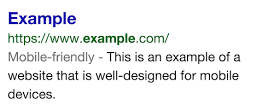Is your website mobile friendly? Part 2.
Part 2
Just one more reason why your website should be mobile optimised; Recently Google just released another feature to inform web browsers on the search page if a website was mobile friendly.
An example of how this looks on mobile searches is below.

Mobile Gets Traffic
With one-quarter of global web searches conducted on a mobile device by over a billion users worldwide, mobile websites are just as important, if not more so, than desktop versions. Multiple sources report that smartphone users are engaging with mobile websites and apps while watching TV, commuting to work, and simultaneously while using a computer.
As Google made clear with last year’s Hummingbird update the future of search is such; mobile and other websites that aren’t usable on handheld devices will see their search rank suffer.
Better Brand Engagement
People like your brand more when you offer a satisfying mobile experience and they’re more likely to return to your website later on a desktop. 90 percent of people report moving between devices, or “multi-screening”, to accomplish a task. When your mobile experience is optimized for functionality and consistency it fosters trust and affinity with users.
On the other hand if your mobile website is difficult to navigate customers are more likely to go to the competition than to visit you on a desktop computer. If you can’t provide what they need when they need it you will have lost the opportunity for the sale and risk losing a customer permanently to a competitor.
Increased Conversions
Desktop websites in mobile browsers are ineffective at converting visitors into buyers. Calls to action (CTAs) are often obscured, links are difficult to click and contact pages are buried in awkward menus. Mobile shoppers have little patience for an unwieldy website and one-third of them will leave a transaction if the site isn’t optimized for mobile.
To make the most of mobile, CTAs should be clear and easy to click and contact information should be one of the first things visitors see. 80 percent of shoppers admit that mobile purchases are impulse-driven and that they’re more likely to purchase from and interact with a brand that offers an engaging mobile experience.
Reduce Your Bounce Rate
Content that looks great on a desktop might be unreadable on a mobile device. Visitors won’t stay on your site if they have to pinch and zoom or squint at illegible type or worse yet if it runs flash or anything that requires add-ons to display in a browser. If your website isn’t optimized professionally for mobile your bounce rate on mobile devices is going to be extremely high. By providing mobile visitors with an appropriate and intuitive user experience you will obviously engage visitors longer and drive more of them to purchase or enquire.
